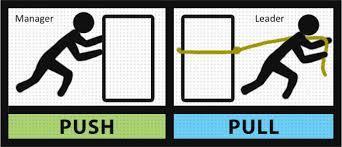Reflect, Ask, Listen and trust
So, you have had a little success in life. Perhaps you have even advanced up to the title of manager or business owner. Each step along the path brings new challenges and opportunities. A part of the journey should include evaluation and reflection. However, often times the business of doing the daily tasks of your position require you to keep your nose to the grindstone and plow through the day, not leaving much time for reflection and evaluation. I say that part of your growth and your journey as a manager or business owner SHOULD include evaluation and reflection because your personal growth depends on it. Evaluating and reflecting on your business and your personal growth moves you from being a manager to a leader!

Today’s business climate is volatile and requires people to be agile. It is also changing from a cultural perspective with the millennial age group and multigenerational workforce. With these changes come a need for business leaders to change as well. Besides evaluating and reflecting, I have three other tips to move you from being a manager to a leader?
- Are good listeners: A challenge for a manager or a boss is that they often feel the need to be the smartest person in the room. They mistakenly think they need to demonstrate their knowledge as they speak more and listen less. A good leader realizes that they do not have to be the smartest person in the room, whereas what they really need is to be a good listener so he/she can learn and grow from listening to and synthesizing what others are saying. The more I deal with people, the more I realize that I make assumptions and jump to conclusions way too often. There are countless instances where I should have listened more before coming to a decision. I love what Liz Wiseman says in her book Multipliers: How the Best leaders Make everyone smarter. She states. “Multipliers don’t just give answers. They provide just enough information to provoke thinking and to help people discover and see the opportunity for themselves. They begin a process of discovery” (pp. 107-108). This leads to the next aspect of moving from being a manager to a leader.
- Ask great questions: I am a firm believer in self-discovery. When people own their decisions and actions, they are more likely to fulfill their obligations and tasks. Wiseman who references the multipliers says, “It is not the Multiplier who whips up this belief. Rather, it is the challenge he or she has issued that generates this commitment. This challenge process builds the intellectual muscle, the emotional energy, and the collective intent to move forward” (p. 121). The leader is responsible to move the organization forward. By helping the employee own their work through asking questions and helping them discover better ways of accomplishing their tasks, the leader is creating a better and more engaged employee.
- Release your people to do the work they were hired to do! As a leader, you cannot do everything. That is why you hire staff. If every time you see a problem you jump in and solve it, you are not giving employees challenged with the tasks an opportunity to learn and grow. Yes, mistakes will be made, but as a leader you are responsible to manage that while giving them more and more opportunities to fly. By releasing the employee, it builds trust. Kim Scott in the book Radical Candor: Be a Kick-Ass Boss Without Losing Your Humanity stated, “If you can build a trusting relationship with people so that they feel free at work, then they’re much more likely to do the best work of their lives” (p. 116).
"Help your employee's own their work by asking questions to help them discover better ways of accomplishing their tasks,"
Every day is a new opportunity to learn and grow into your leadership. Smart people are the ones who know how little they know especially when it comes to leading people. Listen and ask great questions. Build trust in your employees through open conversations. Be clear on your communication, and provide great encouraging feedback. You have the responsibility to be a great leader. Lead well!
Let’s continue the conversation. Tell me what you would add to this list that would exemplify a leader as compared to a manager?
